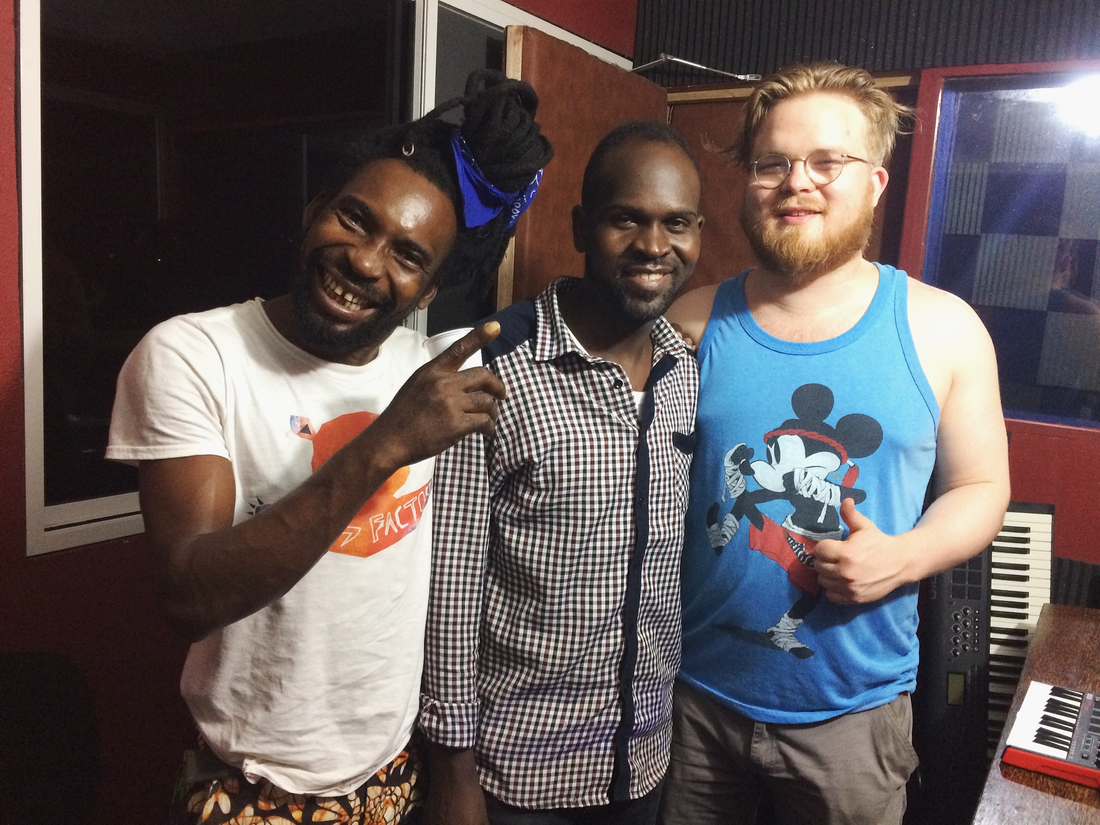Our recording engineer and producer was Balthazar Emmanuel, a laid back gentleman in his thirties who quite well matched the take-it-easy, slightly geeky stereotypes of recording engineers I have even though he was the first professional African recording engineer I had the pleasure to make acquaintance. He had a lot of experience recording a wide range of music at Mtungi from Bongo Flava to church music. My impression was that the emphasis was on the latter. Churches are some of the most powerful organizations in Tanzania with a budget for recording music and with the preference of live instruments because of the style of music that is played in the churches. The church music that I heard was usually a mix of zilipendwa-style beats, polyphonic choral singing, western hymns, and contemporary American gospel influences.
Balthazar was in charge about recording, mixing, and mastering, and he also did a lot of producing on the way. Making records is often mostly about making decisions: 1st take or 2nd take? This or that effect? Which track is going to be loud on top and which is going to be muted? Everybody had a say to these decisions, but especially in the post-production and mixing it was Balthazar, with me and Kifimbo giving comments. Balthazar could work long hours and still keep up an enthusiastic attitude towards music, which is a very important skill for a producer.
Balthazar did not speak English too much, which later on came to be a bit of a challenge for me but it also made me learn Swahili and cross-cultural studio Globish much faster. Kifimbo was usually there to help with the translation, but I came to realize that comments about music are not always the easiest things to translate. Most of the time I work in Finnish-speaking environments when in studio, so quite often I would first come up with my comments in my head in Finnish, which means that the message might go through two translations before reaching Balthazar. For example, I might’ve been thinking that a mix sounds too ”thin” and it lacks a feeling of tightness, bigness, and bass (originally in my mind in Finnish: jotenki ohuen kuulosta, tähän pitäs saada tiukkuuta ja jytyä, tää pitää saada bängäämään) and then Kifiimbo would start talking intense Swahili to Balthazar for a surprisingly long moment and I’m picking up some of it wondering if Kifimbo understood me right. To make sure I would look at Balthazar, say ”Nataka kusikia..” (I want to hear), then hit a closed fist in my other hand's palm with a sound effect of ”tight” and ”bassy” explosion from my mouth followed by a gesture of shaking two huge mangoes in my hands (which hopefully refers to nice bass / low middle frequency EQ in global studio mimicking). Balthazar would always nod and say ”Yes” or ”Poa” (cool) but as we spent more time in the studio I learned to interpret if these signs of approval actually meant that he had understood or not. Also I think my way of expressing myself and his understanding of me (and the other way around) got better with practice.
Working together for a considerable amount of time we developed a workflow with our own way of communication that is based on the on-growing understanding of each other's work methods and preferences, not unlike my previous experiences with producers and musicians in Finland. Even if there is a shared language, it takes time and practice to develop a mutual language about music between people. I guess that this is because of music’s inexact and sometimes mysterious nature, which makes talking about a bit poetic, even though some aspects of music can be approached with clear and technical terms if those terms (of for example music theory or music technology) are familiar to both parties involved. Nevertheless, we understood each other mostly very well, even if sometimes pole pole, "slowly slowly". Many times we would agree on things in Swahili, English, or mimicking without any help from Kifimbo who often was stuck outside the studio in some conversations with fellow artists hanging around the Nafasi Art Space. We also shared some knowledge of music technology that Kifimbo didn’t have, which means we sometimes had conversations Kifimbo wouldn’t understand. What the record sounds like is the result of dialogue with Balthazar and it would sound quite different if anybody in the production team would’ve been someone else or had left the processes non-commented.
In May 2020, while writing this exposition I got the terrible news that Balthazar had suddenly passed away. I have respectfully dedicated this research to his memory.
